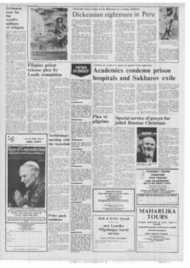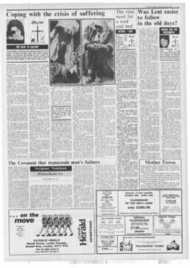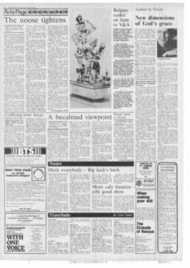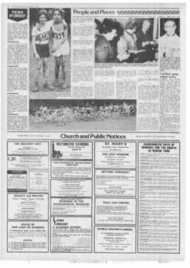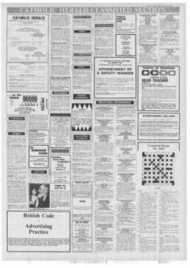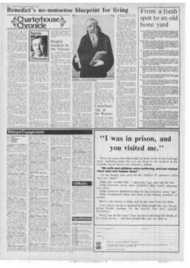Page 3, 29th February 1980
Page 3
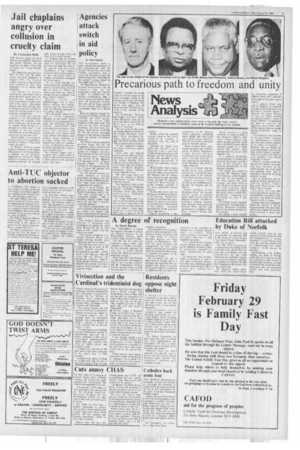
Report an error
Noticed an error on this page?If you've noticed an error in this article please click here to report it.
Tags
Share
Related articles
Polling Day — To Elect A Priest
White Rhodesians 'voted For War'
Pope's Clemency Plea Brings Student Protest
Churches' Protest Gives Africans New Hope
A Majority Not Fooled By South Africa's Ploy
Precarious path to freedom and unity
Rhodesia's three million black voters went to the polls this week. Here a special correspondent in Salisbury looks at the troubled build-up to the election. VANHU VANODA RUGARE reads the election slogan in the local newspaper, telling us the message heard across the length and breadth of Rhodesia: The people want peace, but will peace develop? The hope seems to lie in the outcome of the election.
On Wednesday, Thursday and Friday, some three million black Rhodesians were due to go to the polls to contest the 80 black seats in the 100-seat ! louse of Assembly.
The remaining 20 white seats are already filled by members of Ian Smith's Rhodesian Front party which dominated the white election two weeks ago. The black election results will be announced on Tuesday.
To the uninitiated foreigner the contest could have seemed confusing.
There were nine different parties and over 600 candidates contesting the 80 black seals. The former Patriotic Front Alliance split for the election to form Joshua Nkomo's Patriotic Front and Robert Mugabe's Zimbabwe African National Union, Patriotic Front.
The other major party contesting the election is Bishop Muaorewa's United African National Council.
Two important minor parties are the Reverend Ndabaningi Sithole's Zimbabwe African National Union and James Chikereover's Zimbabwe Democratic Party.
If a single black party is to gain an overall majority it would have to win 51 seats. But as 20 seats have already been reserved for the whites, a black party would have to Will 51 out of 80 black seats to gain an overall majority.
Doubts abOut the peaceful outcome relate to the uneasy nature of the ceasefire, in operation since the end of December.
Although war deaths have fallen from over 60 a day to about -five a day — and some 22,000 armed troops loyal to Mr Mugabe and Mr Nkomo have moved into assembly points, widespread deployment of troops and continuing violence go on.
The Lancaster House Agreement has been well and truly breached. Many troops loyal to Mr Mugabe and Mr Nkomo have remained outside assembly points, although Mr Mugabe's troops have been deployed in greater numbers, especially in the more populated eastern districts.
On the other hand, with the blessing of the British Governor, Lord Soames, Rhodesian Security Forces have been given almost free rein to move around the countryside in contravention of the , widely accepted understanding of the Lancaster House Agreement.
Equally disturbing is the deployment of the Security Force auxiliaries, numbering about 20,000, into many rural areas, often to areas vacated by Patriotic Front forces who have gone to assembly points.
These auxiliary forces were formed two years ago as private armies of Bishop Muaorewa's United African National Council and many of them have been involved directly in electioneering for the Bishop, as senior Rhodesian officials have readily admitted.
There is no doubt that the security forces have regained control over considerable areas of land ceded to the Patriotic Front forces over the past years.
Equally worrying is the attempt by the establishment to discredit Mr Mugabe and Mr Nkomo.
Senior members of the Rhodesian Front "will not and cannot" accept an election result which would bring Mr Mugabe to power. Numbers of Zimbabwe African National Unity Patriotic Front party and Patriotic Front officials and parliamentary candidates have been arrested during the campaign. More sinister is urban terrorism. A senior member of the Reverend Sithole's Zimbabwe African National Unity party was shot dead last month and a ZANU(PF) party official seriously injured in a rocket attack this month, while attempts have been made on Mr Mugabe's life. In a manner strikingly uncharacteristic of modern-day elections, the present and future role of the churches has featured prominently in the election campaign.
The media has sought to discredit Mr Mugabe's party. "No Christians under Mugabe's Marxism" ran the headline in the local paper, but little coverage was given either to party denials or to the section of the party manifesto which guaranteed freedom of religion and spoke about a ZANU(PF) government "respecting and promoting the role of the Church".
The United African National Council under the leadership of Bishop Muzorewa maintains that it is the natural defender of the churches.
The Bishop projects himself as a reconciler, a guarantor of religious liberty and a defender of the right of all people to go to church.
In a national UANC rally held in Salisbury last weekend, one part of the programme was devoted to "women's prayers". However, the former Minister of Law and Order • recently accused the CatholicChurch of being "hell-bent" on supporting the kind of tyrannical and oppressive government which will be imposed upon our people should ZANU(PF) come to power."
The centrality of the churches in the pre-election campaign was well-illustrated a fortnight ago when three bombs exploded in or close to 'churches in Salisbury and one bomb was found unexploded at the sacristy door of the Catholic Cathedral, while two people were killed in a car explosion in the African Toanship of Harare.
When it was discovered that the men who died in one explosion were members of the Selous Scouts, the local press was suddenly silent and all speculation about the bombing incidents ceased.
Also of significance are the deaths in the past month of two Catholic priests, Father Raymond Machikicho and Father Kilian Huesser.
It is ironic and tragic that Father Machikicho should have been killed by supporters of' the guerrillas. The death of Father Iluesser is still a mystery.
If peace does not immediately follow the election, it will be because groups and races have still not yet accepted the need to move towards a more just society.
blog comments powered by Disqus



